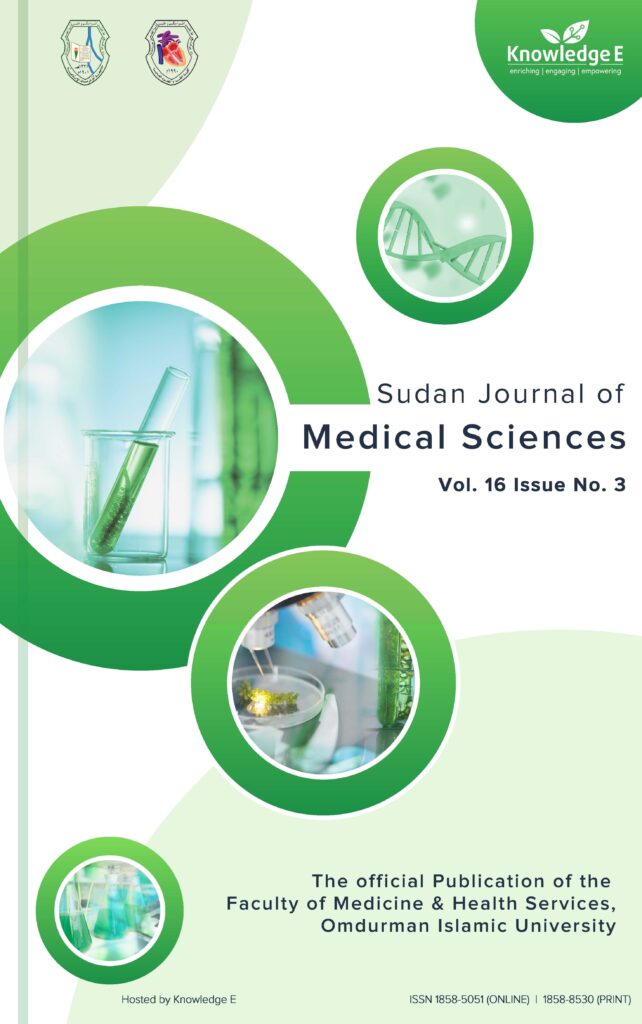
Sudan Journal of Medical Sciences
ISSN: 1858-5051
High-impact research on the latest developments in medicine and healthcare across MENA and Africa
In Their Own Words: Narratives of Sudanese Pediatricians Displaced By Conflict
Published date: Sep 30 2024
Journal Title: Sudan Journal of Medical Sciences
Issue title: Sudan JMS: Volume 19 (2024), Issue No. 3
Pages: 408 – 419
Authors:
Abstract:
Background: This study examines the profound personal and professional impact of the armed conflict in Sudan since April 2023 on pediatricians, particularly focusing on their displacement from Khartoum and the resultant challenges in providing essential health services to children in conflict-affected areas.
Methods: Utilizing a mixed-methods approach, this study targeted displaced pediatricians from Khartoum identified via purposive sampling. Data were collected through a semi-structured questionnaire, featuring both quantitative items and an open-ended question for qualitative insights, administered electronically. The analysis combined descriptive statistics and thematic analysis with ethical oversight provided by the IRB of Prince Sattam Bin Abdulaziz University.
Results: In a study of 42 displaced pediatricians from Sudan, 66.67% were female and the majority were aged between 30 and 45 years. Despite facing adversities due to armed conflict, these pediatricians displayed remarkable resilience and continued to provide pediatric care under challenging conditions. Key themes emerged from their narratives, including professional commitment amid scarcity, emotional turmoil coupled with spiritual reflection, and relentless pursuit of providing care. Safety concerns primarily drove displacement, with 95.24% citing this as a reason. While 61.90% of the respondents relocated within Sudan, 38.10% moved abroad, reflecting the profound personal and professional impact of the conflict.
Conclusion: The armed conflict in Sudan has severely disrupted the pediatric healthcare system, leading to widespread displacement of pediatricians and jeopardizing child healthcare. The study highlights the resilience of healthcare professionals amidst adversity, their struggle to maintain care delivery, and the critical need for support and strategic planning to restore healthcare services in conflictaffected areas.
Keywords: resilience, psychological, armed conflicts, delivery of healthcare, Sudan, pediatricians
References:
[1] Dafallah, A., Elmahi, O. K. O., Ibrahim, M. E., Elsheikh, R. E., & Blanchet, K. (2023). Destruction, disruption and disaster: Sudan’s health system amidst armed conflict. Conflict and Health, 17(1), 43. https://doi.org/10.1186/s13031-023-00542-9
[2] Bashir, A. O., Ibrahim, G. H., Bashier, I. A., & Adam, I. (2013). Neonatal mortality in Sudan: Analysis of the Sudan household survey, 2010. BMC Public Health, 13(1), 287. https://doi.org/10.1186/1471-2458-13-287
[3] UNICEF. (2023, June 16). UNICEF Sudan humanitarian situation report: June 2023. https://www.unicef.org/sudan/reports/unicef-sudanhumanitarian- situation-report-june-2023-0
[4] Galal Albani, S. F., Abdelgadir Mohamed, A., Ahmed, A. A., & Ahmed, W. A. (2023). Emergency care capacity in pediatric hospitals. Malaysian Journal of Medicine and Health Sciences, 19(1), 25–30. https://doi.org/10.47836/mjmhs.19.1.5
[5] Ali, S., & Medani, M. E. A. M. E. (2022). Pediatric cardiac services in Sudan: Achievements, challenges, and future perspectives (2004- 2021). Frontiers in Pediatrics, 10, 793188. https://doi.org/10.3389/fped.2022.793188
[6] Karimeldin, S. (2016). The perception of stakeholders towards services provided by primary health care in Khartoum State, Sudan. Sudan JMS, 11(1), 1–5.
[7] United Nations. (2023, July 27). Sudan health crisis reaches ‘gravely serious levels’: WHO. https://news.un.org/en/story/2023/07/1139192
[8] Mohamed, I. N., Abdelraheem, M. B., & Abdullah, M. A. (2012). Sudanese female doctors in paediatrics. Sudanese Journal of Paediatrics, 12(2), 36–43.
[9] Cultural Atlas. (2018). North Sudanese culture. https://culturalatlas.sbs.com.au/north-sudaneseculture/ north-sudanese-culture-family
[10] Seelinger, K. T. (2023). Twelve postcards from the frontlines: Reflections from healthcare providers operating in armed conflict. Narrative Inquiry in Bioethics, 13(3), 193–197. https://doi.org/10.1353/nib.2023.a924190
[11] Nkiese, J. K., Wirba, S. K., Nkiese, J. K., & Wirba, S. K. (2023). Perspective chapter: Armed conflict and its impact on human migration. In A. Michaud, S. P. Stawicki, & R. Izurieta (Eds.), Global health security – Contemporary considerations and developments. IntechOpen.
[12] Khogali, A., & Homeida, A. (2023). Impact of the 2023 armed conflict on Sudan’s healthcare system. Public Health Challenges, 2(4), e134. https://doi.org/10.1002/puh2.134